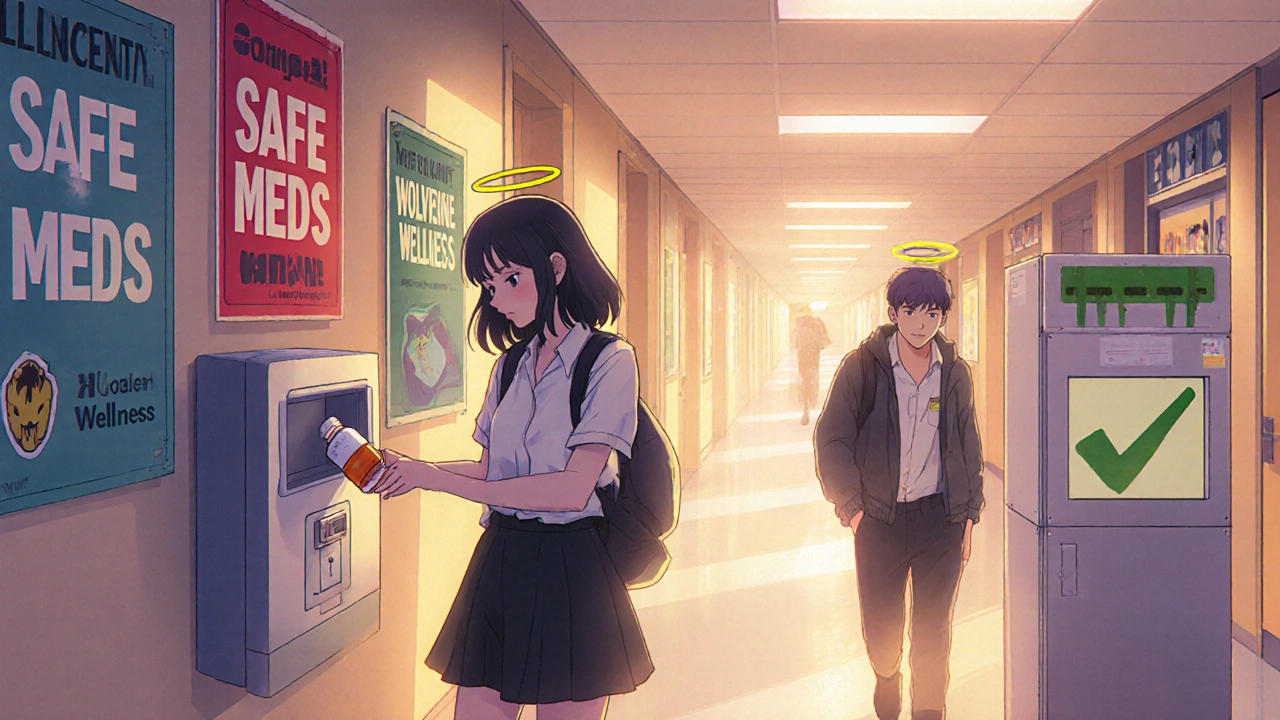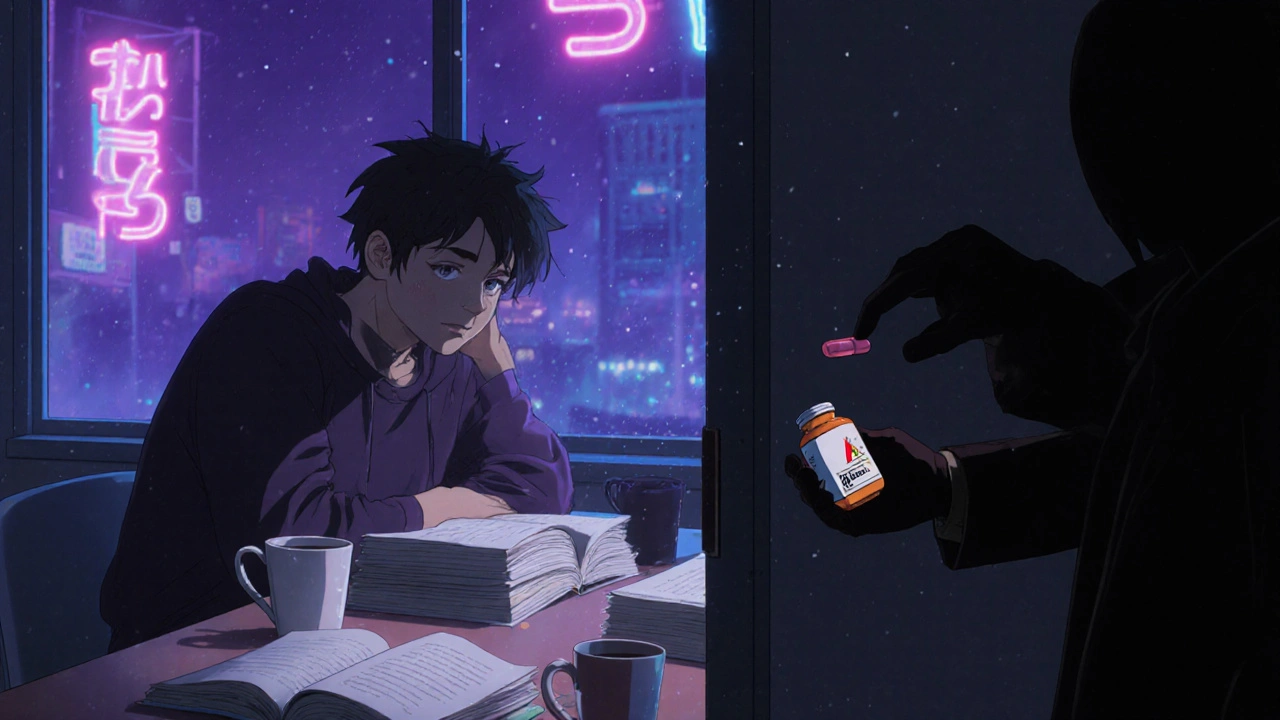Every year, thousands of college students start the semester with good intentions: get good grades, stay healthy, manage stress. But somewhere between late-night study sessions and exam week, a dangerous habit creeps in-borrowing a friend’s Adderall to stay awake, popping a leftover painkiller for a headache, or sharing sleeping pills to cope with anxiety. What seems harmless can quickly become life-threatening. Medication safety isn’t just for older adults or hospital patients. It’s a daily necessity for anyone under 25 navigating college life.
Why College Students Are at Higher Risk
Young adults aged 18 to 25 are the most likely age group to misuse prescription drugs. According to the National Survey on Drug Use and Health, over 28% of college-aged individuals have misused a prescription psychotherapeutic drug at least once in their lifetime. That’s not just a few people-it’s nearly one in three. The biggest driver? Academic pressure. Students think they need stimulants like Adderall or Ritalin to keep up, even if they don’t have a diagnosis. A 2021 study found that 75% of prescription drug misuse cases among students involved stimulants. And 60% of those drugs came from friends, roommates, or classmates-not a pharmacy.The Most Commonly Misused Drugs
Not all prescription drugs are the same when it comes to misuse. Three categories stand out:- Stimulants (Adderall, Ritalin): Used to boost focus, but can cause rapid heartbeat, high blood pressure, anxiety, and addiction. Nearly 9% of college students reported misusing Adderall in one survey.
- Pain relievers (Vicodin, OxyContin): Once the most common, misuse has dropped slightly, but still affects 5-6% of students. These can lead to dependence and, in extreme cases, overdose.
- Sedatives and tranquilizers (Xanax, Valium): Used to calm nerves or help with sleep. Misuse is rising, especially among students with untreated anxiety. Taking these without medical supervision can slow breathing to dangerous levels.
Here’s what you need to know: just because a drug is prescribed doesn’t mean it’s safe for you. Your body reacts differently than someone else’s. A dose that helps your roommate focus might send you to the ER.
Where the Danger Comes From
Most students don’t buy drugs on the street. They get them from people they trust. A 2020 University of California survey found that 42% of students knew exactly where to get stimulants without a prescription on campus. That’s not hard to believe-how many of you have seen someone pass out pills before finals? Reddit threads from r/college are full of posts like: “I’ve seen Adderall passed around like candy.” The problem isn’t just the drugs-it’s the normalization of sharing them.Even worse, many students don’t realize they’re breaking the law. Sharing prescription medication is illegal, even if you’re not charging money. And if something goes wrong-heart palpitations, seizures, a bad reaction-you could be held responsible.

What Happens When You Misuse Medication
It’s easy to think, “I’m just taking one pill.” But one pill can be enough. Stimulant misuse has been linked to:- Increased heart rate and high blood pressure
- Insomnia and disrupted sleep cycles
- Anxiety, paranoia, and panic attacks
- Dependence and withdrawal symptoms
- Emergency room visits-up threefold between 2005 and 2010
One student at the University of Michigan described her experience: “I thought Adderall would help me finish my paper. Instead, I couldn’t sleep for 48 hours. My heart felt like it was pounding out of my chest. I didn’t tell anyone until I passed out in the library.” She ended up in the campus health center, where staff confirmed she had no prescription for the drug.
Safe Storage and Disposal
If you have a legitimate prescription, storing it safely matters. Leaving pills on your nightstand or in your backpack is asking for trouble. In 2019, the University of Florida launched a program called “Safe Meds,” giving students free lock boxes for their medication. Within two years, stimulant misuse on campus dropped by 18%.Here’s how to store your meds safely:
- Keep them in their original bottle with the pharmacy label
- Store them in a locked drawer or box-not your dorm room’s open desk
- Never carry them in your pocket or purse where they can be easily taken
And when you’re done? Don’t flush them. Don’t toss them in the trash. Use a medication disposal kiosk. Many campuses now have them in health centers, pharmacies, or even campus police stations. A 2022 study showed that students who got a quick reminder during a routine health visit were 35% more likely to dispose of meds properly.
What Works: Real Solutions on Campus
Colleges aren’t ignoring the problem. Over 1,400 campuses now have dedicated medication safety programs-up from just 215 in 2015. The most effective ones don’t just hand out pamphlets. They combine support systems:- Academic coaching: Helping students manage time and stress without drugs
- Mental health services: Treating anxiety and depression so students don’t self-medicate
- Peer education: Students teaching students about real risks, not scare tactics
The University of Michigan’s “Wolverine Wellness” program reduced stimulant misuse by 22% while increasing use of academic coaching by 47%. That’s the key-offering better alternatives, not just saying “don’t do it.”

What You Can Do Today
You don’t need to wait for your school to fix this. Start with these steps:- Know your meds: If you have a prescription, read the label. Know the side effects. Never take more than prescribed.
- Never share: Even if your friend begs. Even if you think it’s “just this once.”
- Ask for help: If you’re stressed, tired, or overwhelmed, talk to your campus counselor. You’re not weak for needing support.
- Use disposal bins: Find the nearest drop-off location. It’s free and anonymous.
- Speak up: If you see someone sharing pills, say something. You might save a life.
Why This Matters Beyond College
The habits you form now stick with you. Students who misuse stimulants in college are more likely to develop substance use disorders later. The CDC found that 14% of high schoolers misused prescription opioids-many carry that behavior into college. But the good news? You can break the cycle. Every student who chooses to store their meds safely, who refuses to share, who reaches out for help instead of popping a pill-makes the campus safer for everyone.Medication safety isn’t about being perfect. It’s about being aware. It’s about knowing that a pill meant for someone else isn’t a shortcut-it’s a risk. And you deserve to get through college without putting your health on the line.
Is it illegal to share my prescription medication with a friend?
Yes. Sharing any prescription medication-even if you’re not charging money-is against the law. The DEA classifies most prescription drugs like Adderall, Xanax, and opioids as controlled substances. Giving them to someone without a prescription can lead to criminal charges, especially if that person has a bad reaction. It’s not just risky-it’s illegal.
Can I get addicted to stimulants if I only use them for exams?
Yes. Stimulants like Adderall and Ritalin affect the brain’s reward system. Even occasional use can lead to tolerance, meaning you need more to get the same effect. Over time, your brain starts relying on the drug to feel normal. Withdrawal can cause extreme fatigue, depression, and intense cravings. Addiction doesn’t happen overnight, but it can start with just a few doses.
What should I do if I think a friend is misusing prescription drugs?
Talk to them-calmly and without judgment. Say something like, “I’ve noticed you’ve been taking pills before class. Are you okay?” Offer to go with them to campus health services. Many students don’t realize they’re in danger until someone cares enough to ask. If they’re in immediate danger, contact campus security or emergency services. Your intervention could save their life.
Are there safe alternatives to stimulants for staying focused?
Absolutely. Studies show that regular sleep, physical activity, and structured study schedules improve focus more than stimulants. Try the Pomodoro Technique (25 minutes of work, 5-minute break), limit caffeine after noon, and get at least 7 hours of sleep. Many campuses offer free time management coaching, mindfulness workshops, and academic tutoring-all proven to help without drugs.
How do I know if my prescription is being misused?
Signs include: running out of pills early, needing refills more often than prescribed, feeling anxious or irritable when you don’t take the medication, or hiding your use from others. If you notice these patterns, talk to your doctor. You might need a different treatment plan. Misuse doesn’t mean you’re a bad person-it means your current approach isn’t working.
Can I get help for prescription drug misuse without my parents knowing?
Yes. In the U.S., students over 18 have the right to confidential medical care. Campus health centers, counseling services, and student wellness programs are legally required to keep your information private unless there’s an immediate risk to your life. You don’t need parental consent to get help for medication misuse.


vanessa k
November 14, 2025 AT 02:05My roommate took my Adderall last week because she had a paper due. She ended up in the ER. I didn’t even know she had it until the nurse called me. I’m not mad at her-I’m mad at the system that made her feel like she had no other choice. This isn’t about laziness. It’s about burnout.
manish kumar
November 15, 2025 AT 08:23Let me tell you something that no one talks about-college is designed to break you. The curriculum, the deadlines, the social pressure-it’s all engineered to make you feel like you’re falling behind unless you’re constantly performing. Adderall isn’t the problem; it’s the symptom. We’ve turned education into a race with no finish line, and then we blame the kids for running too fast. The real solution isn’t locking up pills-it’s rethinking how we measure success. Can we really call someone a failure because they didn’t ace a midterm while sleep-deprived and anxious? I don’t think so.
Nicole M
November 15, 2025 AT 16:30I had no idea sharing my Xanax was illegal until I read this. I thought it was like lending someone a book. I’ve given it to two friends during panic attacks. Now I’m terrified. Where do I even find a disposal bin on campus?
Arpita Shukla
November 16, 2025 AT 21:29Actually, the data here is misleading. The 28% statistic includes people who took a single dose at a party. That’s not misuse-that’s experimentation. True dependence is closer to 4-5%. Also, the University of Michigan study you cited had a sample size of 300 students. Not exactly statistically significant. And why are you ignoring the fact that stimulants improve cognitive performance in neurotypical individuals? The real issue is stigma, not safety. If we treated these like coffee, no one would blink.
Benjamin Stöffler
November 18, 2025 AT 02:05And yet-here we are-consuming pharmaceuticals like they’re candy, while simultaneously pretending that the brain is a black box that doesn’t respond to external stimuli. We’ve outsourced our willpower to chemistry, and now we’re shocked when the chemistry fails us. The pill doesn’t make you smarter-it makes you numb. And numbness isn’t productivity; it’s avoidance. You can’t outsource your humanity to a Schedule II controlled substance. The real question isn’t ‘How do we stop sharing?’-it’s ‘Why do we feel we need to?’
Mark Rutkowski
November 19, 2025 AT 02:01I used to think I needed Adderall to survive finals. Then I started walking to class instead of taking the bus. I slept 7 hours. I turned off my phone for 90 minutes before studying. I didn’t need the pill-I needed to stop treating myself like a machine. The truth? Your brain isn’t broken. It’s just exhausted. And the cure isn’t more drugs-it’s more rest, more kindness, more space to breathe. You’re not lazy. You’re just human.
Ryan Everhart
November 19, 2025 AT 19:54So let me get this straight-you’re telling me that if I don’t take a drug I don’t need, I’m somehow morally superior? Wow. What a revolution. Next you’ll tell me that drinking coffee is a virtue. Chill. Everyone’s just trying to survive. The real villain here is the academic industrial complex-not the kid who popped a pill to finish a paper.
David Barry
November 20, 2025 AT 17:27Let’s be brutally honest: this post is performative. You’re not trying to help-you’re trying to feel virtuous. The fact that you’re even writing this means you’ve never had to choose between sleeping or passing a class. The students who misuse meds aren’t idiots. They’re survivors. And if your solution is ‘just use a disposal bin,’ you haven’t actually listened to a single person who’s been there. Real change doesn’t come from pamphlets. It comes from dismantling the system that made this necessary.
Alyssa Lopez
November 21, 2025 AT 18:09USA is the only country that lets this happen. In Germany, you can’t even buy aspirin without a prescription. We need stricter controls. No more lax attitudes. These drugs are weapons. If you’re not prescribed them, you shouldn’t have access. Period. This isn’t freedom-it’s negligence.
Alex Ramos
November 23, 2025 AT 02:20Just wanted to say-I used to share my Ritalin too. I thought I was helping. Then I saw a friend have a panic attack after taking mine. I felt awful. I started using the campus disposal kiosk. Also, I signed up for the time management workshop. It’s free. They even give you snacks. You don’t need a pill to get through finals. You just need to ask for help. And yeah, it’s okay to be scared. I was too.
edgar popa
November 23, 2025 AT 15:04